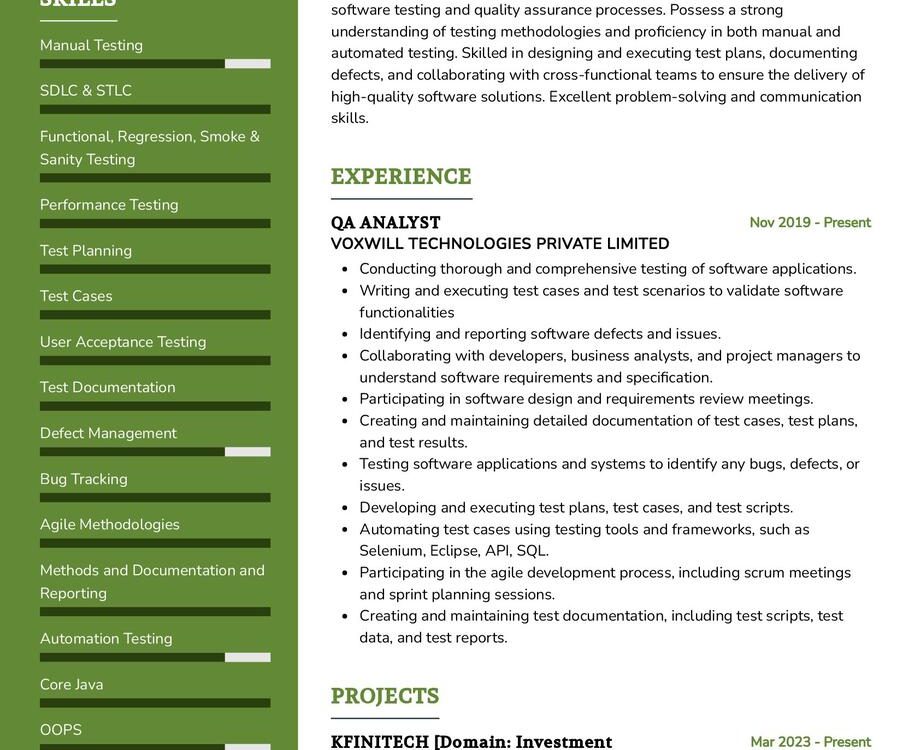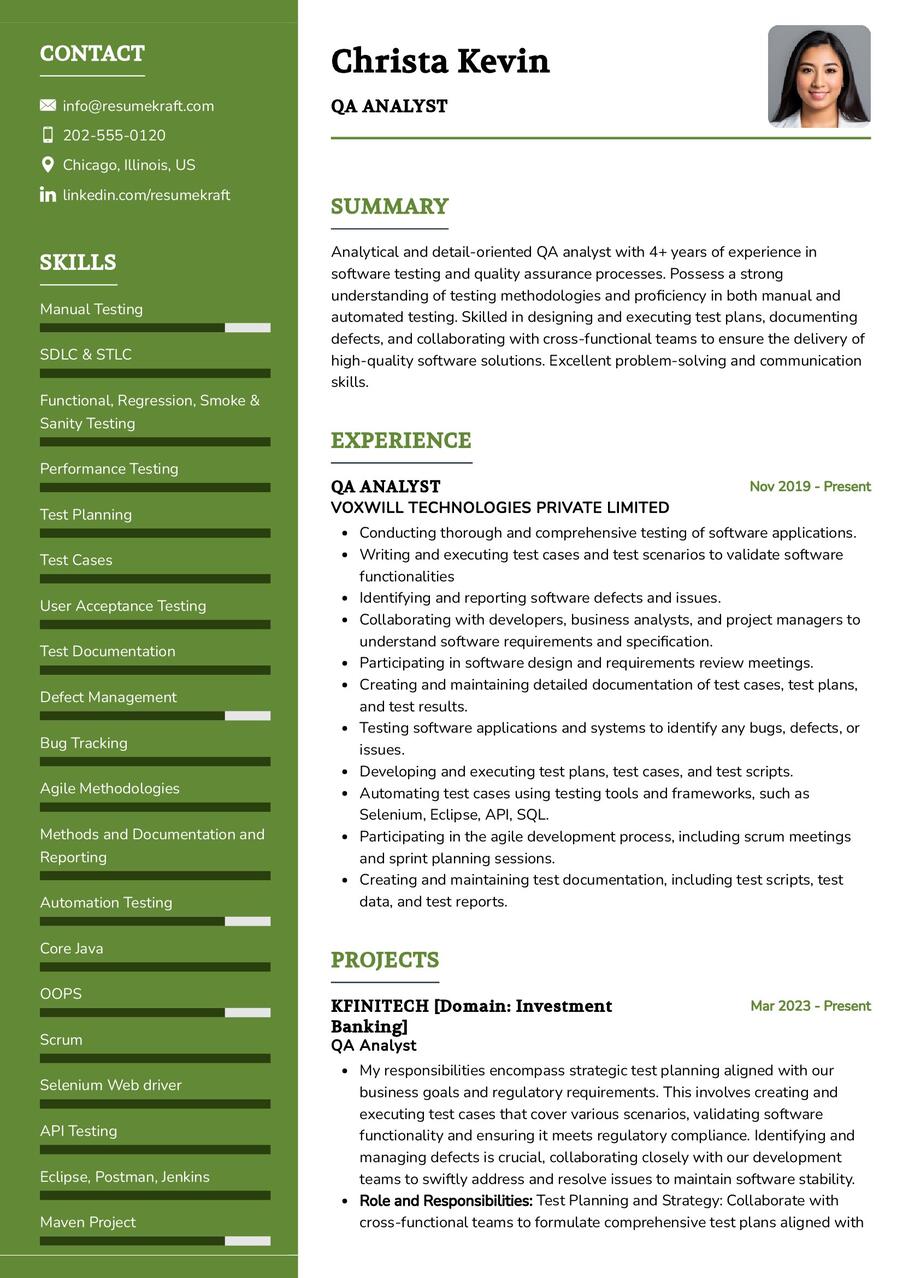Exploring the Role of a QA Analyst
As the demand for quality software continues to rise, the role of a QA Analyst becomes increasingly crucial in the realm of technology. This position requires a unique blend of analytical skills, attention to detail, and a deep understanding of software testing methodologies. Let’s dive into the multifaceted world of a QA Analyst, a role that plays a pivotal role in ensuring the seamless functionality and reliability of software applications.
A QA Analyst is responsible for meticulously testing software applications to identify and resolve any defects or issues before they reach the end-users. This role requires a keen eye for detail and the ability to work closely with development teams to ensure the delivery of high-quality software. The QA Analyst is not just a tester; they are a quality advocate, contributing to the overall success of software projects.
Key Requirements for a QA Analyst Role
Becoming a successful QA Analyst involves meeting specific requirements that showcase a combination of technical skills and attention to detail. Here are the key prerequisites for aspiring QA Analysts:
- A Bachelor’s degree in Computer Science, Information Technology, or a related field, providing a solid foundation in the technical aspects of software testing.
- Proficiency in various testing methodologies, including manual and automated testing, with a focus on delivering high-quality software products.
- Experience in creating test plans, test cases, and test scripts to systematically test software functionality.
- Knowledge of testing tools such as Selenium, JIRA, or TestRail, enhancing efficiency and effectiveness in the testing process.
- Strong analytical and problem-solving skills, essential for identifying and troubleshooting software defects.
- Effective communication skills to collaborate with cross-functional teams and communicate testing results clearly.
Obtaining relevant certifications in software testing, such as ISTQB or Certified Agile Tester, can further enhance the CV of a QA Analyst.
Responsibilities of a QA Analyst
The role of a QA Analyst is diverse, encompassing various responsibilities that contribute to the overall quality assurance process. Here are the key responsibilities that define the role of a QA Analyst:
- Developing and executing comprehensive test plans to ensure thorough testing of software applications.
- Collaborating with developers and other stakeholders to understand project requirements and identify potential areas of improvement.
- Conducting both manual and automated testing to validate the functionality, performance, and security of software applications.
- Logging and tracking defects, working closely with development teams to ensure timely resolution.
- Participating in Agile or Scrum processes, providing valuable input during sprint planning and review meetings.
- Contributing to the continuous improvement of testing processes and methodologies within the organization.
- Providing clear and concise testing documentation for reference and future testing cycles.
Each responsibility carries its own set of challenges and learning opportunities, shaping the QA Analyst into a critical player in the software development lifecycle.
QA Analyst CV Writing Tips
Crafting a compelling CV is essential for showcasing your skills and experiences as a QA Analyst. Here are some tips to help you create a standout CV:
- Highlight specific testing projects you’ve worked on, detailing the methodologies used and the impact on software quality.
- Showcase your expertise in testing tools and technologies, emphasizing your ability to adapt to different testing environments.
- Quantify your achievements, such as the percentage of defects reduced or the efficiency improvements brought to the testing process.
- List any relevant certifications, demonstrating your commitment to professional development in the field of software testing.
- Customize your CV for each application, aligning your skills and experiences with the specific requirements of the job.
Your CV is your professional story; make it compelling and tailored to stand out in the competitive job market.
QA Analyst CV Summary Examples
Your CV summary is the gateway to your professional journey, providing a quick snapshot of your skills and experiences. Here are some examples to inspire your QA Analyst CV summary:
- “Detail-oriented QA Analyst with a proven track record in implementing effective testing strategies, reducing defects by 25%, and enhancing overall software quality.”
- “Experienced QA Analyst with expertise in automated testing using Selenium, contributing to a 30% improvement in testing efficiency and accuracy.”
- “Results-driven QA Analyst with a focus on continuous improvement, adept at collaborating with cross-functional teams to deliver high-quality software.”
Each summary is a window into your QA Analyst journey, offering a glimpse of your achievements and contributions to software quality.
Building a Strong Experience Section for Your QA Analyst CV
The experience section of your CV is where you delve into the details of your professional journey as a QA Analyst. Here are some examples to guide you in building a strong experience section:
- “Led the testing efforts for a critical software release, identifying and resolving 90% of defects before the product reached the production stage.”
- “Implemented automated testing scripts, resulting in a 40% reduction in testing time and increased efficiency in the QA process.”
- “Collaborated with development teams in an Agile environment, contributing to the successful delivery of multiple software projects on time and within scope.”
Each experience is a chapter in your QA Analyst journey, narrating stories of challenges met, solutions found, and successes achieved.
Educational Background for Your QA Analyst CV
Your educational background is a testament to your knowledge and expertise in the field of software testing. Here’s how you can list your educational milestones in your QA Analyst CV:
- Bachelor of Science in Computer Science, XYZ University, the foundation of your technical knowledge, 2015.
- ISTQB Certified Tester, a recognition of your proficiency in software testing principles, 2016.
- Master of Science in Information Technology, ABC University, a journey of advanced learning and specialization, 2018.
Each educational qualification is a stepping stone, contributing to your success as a QA Analyst.
QA Analyst Skills for Your CV
Your skill set is your toolkit, equipped with a diverse range of tools that you have honed over the years. Here are the essential skills that a QA Analyst should possess:
Soft Skills:
- Attention to detail, the ability to spot even the smallest defects in software applications.
- Analytical thinking, crucial for assessing complex software systems and identifying potential issues.
- Communication skills, both written and verbal, for effective collaboration with development teams and stakeholders.
- Adaptability, the flexibility to work in different testing environments and adapt to evolving project requirements.
- Problem-solving abilities, essential for troubleshooting and resolving software defects efficiently.
Hard Skills:
- Proficiency in testing tools such as Selenium, JIRA, or TestRail, enhancing the efficiency of the testing process.
- Knowledge of various testing methodologies, including manual and automated testing, to ensure comprehensive test coverage.
- Experience in creating test plans, test cases, and test scripts for systematic software testing.
- Understanding of Agile and Scrum methodologies, contributing to collaborative and iterative software development processes.
- Attention to security testing, ensuring that software applications meet industry standards for data protection.
Each skill is a tool, aiding you in providing exceptional quality assurance and contributing to the success of software projects.
Common Mistakes to Avoid When Writing a QA Analyst CV
Avoiding common pitfalls is crucial when crafting your QA Analyst CV. Here are some mistakes to steer clear of:
- Using generic terminology; instead, tailor your CV to highlight specific testing experiences and achievements.
- Omitting quantifiable achievements; be sure to showcase the impact of your testing efforts with measurable results.
- Overlooking the importance of a customized cover letter; use it as an opportunity to express your interest and align your skills with the job requirements.
- Overloading your CV with technical jargon; ensure that your CV is accessible to both technical and non-technical audiences.
- Failing to proofread; errors in your CV can create a negative impression, so review it thoroughly before submission.
Avoiding these mistakes will help you create a CV that effectively communicates your expertise and stands out in the competitive job market.
Key Takeaways for Your QA Analyst CV
As you wrap up your journey in crafting a compelling QA Analyst CV, remember these key points:
- Highlight specific testing experiences and achievements to showcase your impact on software quality.
- Emphasize your proficiency in testing tools and methodologies, demonstrating your adaptability to different testing environments.
- Quantify your achievements with measurable results to provide concrete evidence of your contributions.
- Include relevant certifications to validate your expertise and commitment to professional development in software testing.
Your CV is not just a document; it is a narrative of your journey as a QA Analyst, illustrating your skills, experiences, and commitment to ensuring software quality. Best of luck in your job search!
Finally, feel free to utilize resources like AI CV Builder, CV Design, CV Samples, CV Examples, CV Skills, CV Help, CV Synonyms, and Job Responsibilities to create a standout application and prepare for the QA Analyst job interview.



